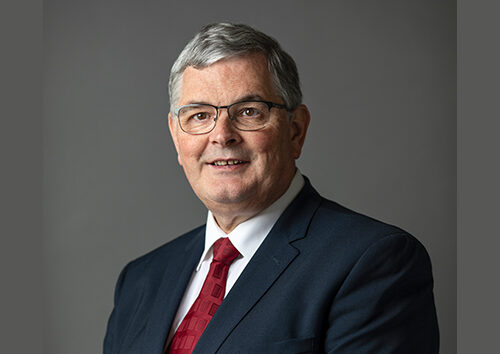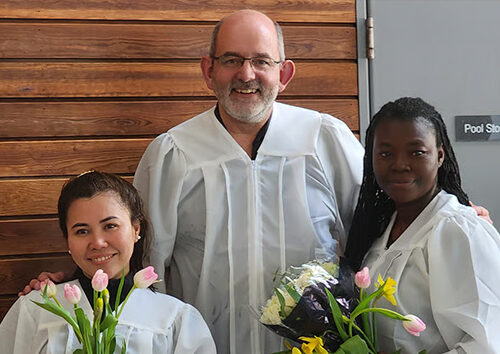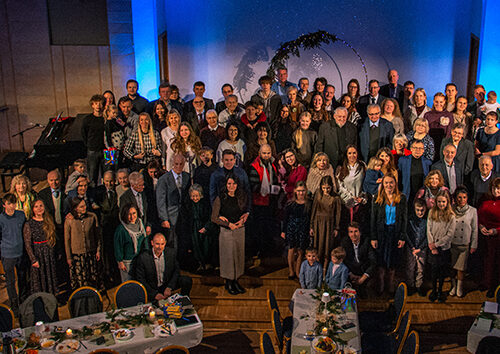29 August 2024 | Belgrade, Serbia [Nathan Stickland with tedNEWS]
The Wednesday morning lineup of presenters at the European Pastors Council (EPC) 2024 brought echoes of Tuesday evening’s devotional, along with mental images some might prefer not to dwell on.
Starting with a plastic bag, not a bucket, Mervi Cederstom, a pastor from Sweden, shared a devotional so vivid that it was almost nauseating. Cederstom told how she boarded a plane, having prepared herself with a plastic bag in case she felt sick. To her surprise, the passenger beside her, a 10-year-old boy, sat with a bigger bag on his lap in case he felt ill too. Mercifully, neither of them was sick throughout the flight, and they actually enjoyed the journey.
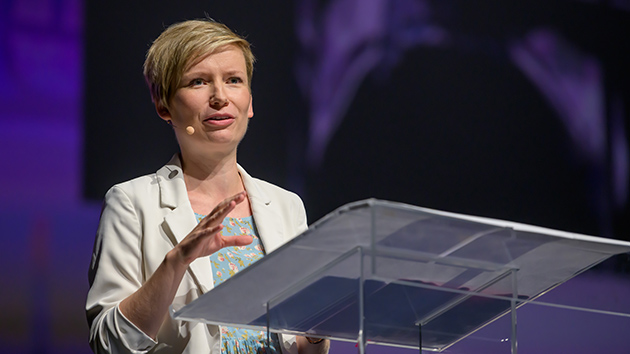
The lesson learned? “When it seems there is nothing to offer, it’s worth reconsidering.” Cederstom believed she had nothing to offer on that flight, but in the event of someone worse off than herself, she discovered she was wrong. “It is in the filling up of our buckets that we get to overflow into other people’s buckets,” she challenged the audience.
Pivoting on the story of the Samaritan woman, Cederstom suggested this woman might also have believed she had nothing to offer her past husbands—possibly because she was barren. However, upon meeting Jesus, her dry bucket was filled to overflowing. This overflow spilt throughout the town as she speedily returned to announce to the townspeople that she might have found and met the Messiah. “Buckets will always run dry,” said Cederstom, but encountering Jesus will make them gush, splash, and spill over others.
Cederstom concluded her message by sharing a personal, sombre, and heart-wrenching story of a miscarriage. It was Good Friday, but she chose to keep her preaching appointment that following Sabbath. The talk was on New Life. Holding things together, Cederstom invited the audience to allow the effortless spring from deep within to burst out and become visible.
These stories held everyone in captivated silence, a silence latent with emotion. The session concluded with an invitation to be so filled with faith that it overflows, filling the buckets of others as well. A tempered but encouraging round of applause accompanied Cederstom as she left the platform. However, how easy is it to forget such an invitation amidst the sound of the following song? It must not be forgotten. Let this be a reminder, or an extended written invitation, for all, even those with dust-filled, empty buckets, to be filled with the spring of water Jesus promises, to the point of flooding into the lives of others.
Ideas Worth Spreading
The best was yet to come; well, Adam Best, to be precise, admitted walking through the hotel corridor dripping wet, towel-less, having been for a swim. He led a trio of presenters who linked their short TED-style talks on extending love. Utilising the story of the four lepers in 2 Kings 6, who realised they should tell the besieged city occupants that the enemy army had fled and that they should not keep the loot to themselves, Best questioned the audience about how their experience of God had benefited others. This resonated with Cederstom’s overspilling bucket analogy.
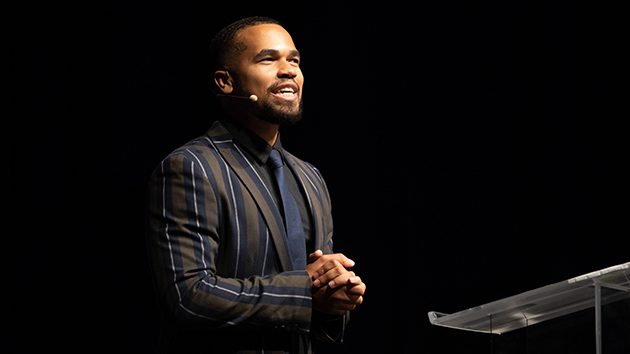
Best referenced a text many of the ministers in the room had probably preached on before that the command to love others as Jesus first loved them (John 13:34) is central to the Christian message.
As a graduate ministerial student from Newbold College of Higher Education (NCHE), Best was perhaps cheeky in asking, “If one weren’t the pastor of their local church, would the community notice they were gone?” He then asked, “What evidence do others have of one being loving?”
This provoked thought among the audience, raising the question of how much the leakage from one’s bucket of faith in Jesus might incidentally or intentionally douse others.
Ivana Mendez, a lecturer in Biblical Languages at NCHE, took the baton next as Best sat on the sofas on stage with David Neal and Vanesa Pizzuto, who later led a question-and-answer session with the three presenters.
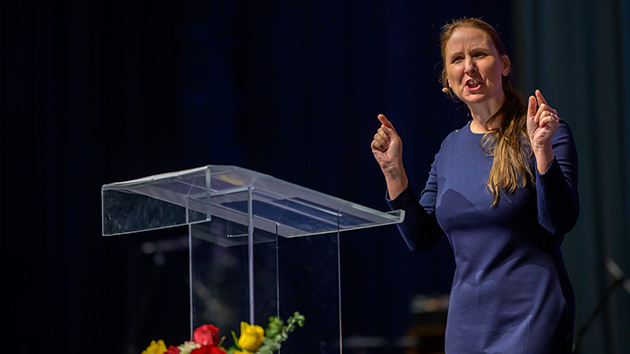
Mendez admitted she had changed the trajectory of her talk following a conversation some months ago with several of her students. Two fellow students who had been eager for denominational employment had dropped down to one, as the other now saw too much politics in the Church and did not want to be part of it.
As the second speaker to reference John 13:34, Mendez admitted she had omitted “showing love to colleagues” from her list of ways to show love to others. She acknowledged that she had a blind spot, admitting that the problem with blind spots is that they go unnoticed until they cause an issue. She described it as an “out of sight, out of mind effect” that she now wanted to address with colleagues.
Mendez suggested that if others had also addressed this blind spot, perhaps they would not have experienced burnout or felt compelled to resign. She advocated for a team spirit when it comes to sharing love with fellow staff and ministers.
A statement that elicited a response from the audience was about colleagues who had walked away from employment. “God has not said, ‘the field is small, the workers are too many, some can leave.’” The implication was that some might not have left if there had been more love extended between colleagues.
Mendez referenced the COVID lockdown as a “time of paradoxical beauty,” suggesting that the changes during that period provided opportunities for more innovative collaboration and a greater appreciation of what each person has to offer.
Being honest about the unsent letter of resignation she had written in the past, Mendez closed by challenging the audience to show Christ’s love to colleagues through daily actions. The question remains: Is this a challenge that readers are up for?
Another NCHE student, Sophia Nicholls, tackled the theme of extending love through a personal story about her disabled son. Citing a 1:4 ratio in the European Union of disabled to able-bodied populations, Nicholls highlighted the importance of fostering engagement (not mere inclusion) for people with disabilities in local church communities.
Sharing a story of a church that had no deaf members but started providing sign language during services, she told of a visitor who needed sign language and how others subsequently joined the group because sign language was offered. Nicholls concluded her presentation by highlighting the intrinsic value of all people, and the importance of unlearning prejudices and moving towards co-labouring with people with disabilities.
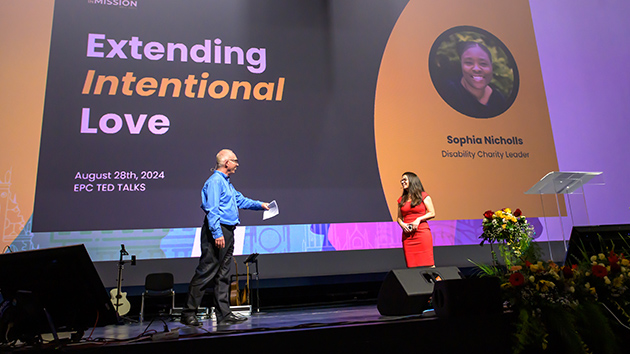
The final section of the morning programme included a Q&A time with the presenters, which provided an opportunity to explore busyness among ministers and how it can negate basic cordiality and expressions of practical love. The discussion also highlighted the importance of seeing colleagues not as competitors but as fellow travellers, noticing people in the corners, and letting them know they are appreciated.
Photos: [Tor Tjeransen and James Botha, Adventist Media Exchange, CC BY 4.0].

